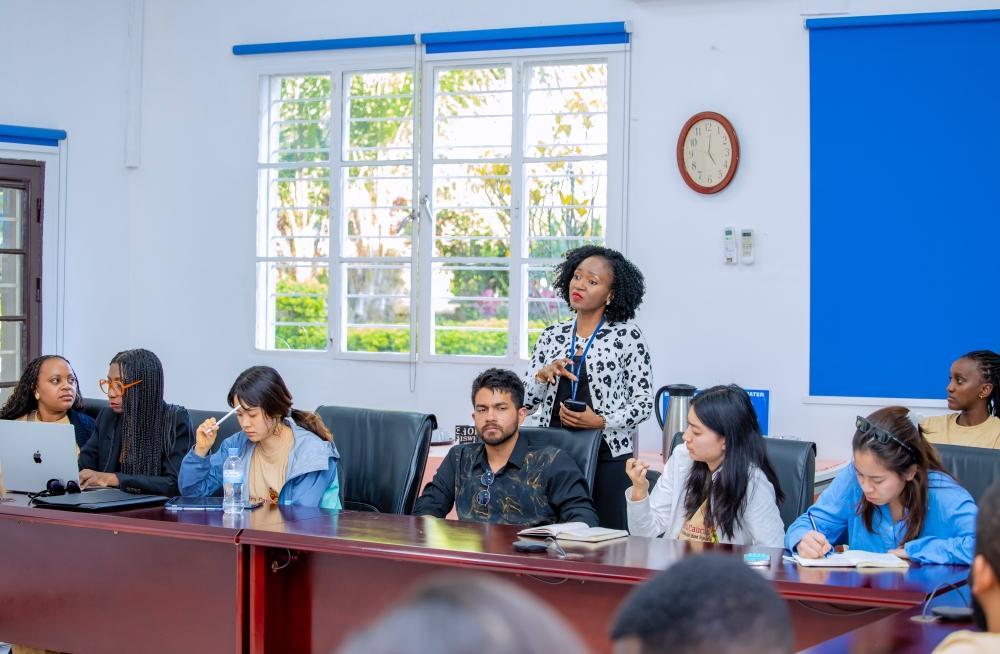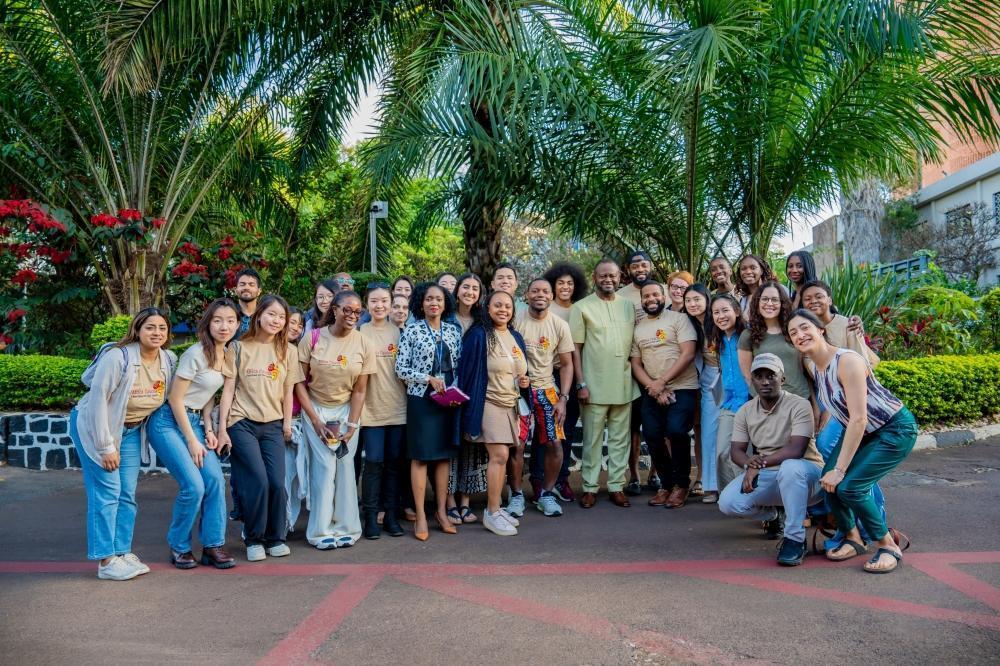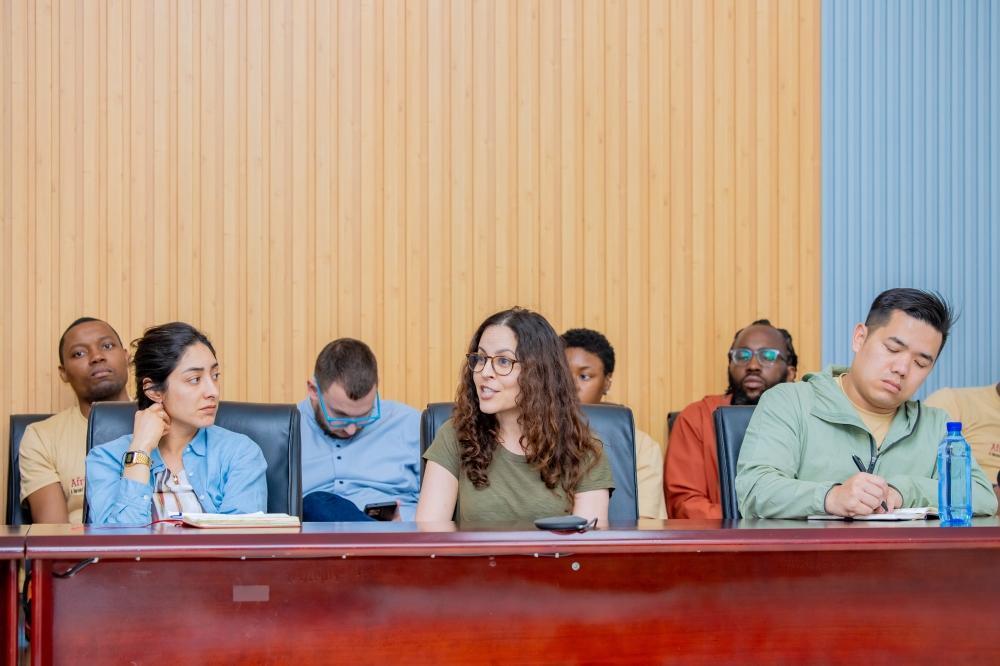Africa-Press – Rwanda. For the past one week, students from Harvard Kennedy School have been on a study tour in Rwanda to learn about the country’s history, culture, and development journey. They held discussion with different government officials to discuss Rwanda’s approach to governance, investment, trade, tourism, and conservation, as well as visited various places.
The trip was organized under the Africa Caucus, the Harvard Kennedy School student organization focusing on Africa.
The New Times spoke to some participants who shared their experiences and lessons learnt from the country, which mainly led to a perspective shift towards developing countries.
Yuchen Rain Ji, 24-year-old Chinese pursuing a Master of Public Policy
It’s my first visit to Rwanda and we landed in Kigali at night. On the drive from the airport to our hotel, I noticed a lot of motorcycles and what surprised me personally was that everyone was wearing a helmet meaning that people took safety seriously and everything seemed to be very well organized and well regulated.
We visited Rwanda Development Board, Ministry of Justice, Ministry of Education, and Kigali Innovation City, just to name a few, and it’s really clear that Rwanda is really looking to position itself to become the next innovation hub for Africa and trying to reap the benefits.
I was very impressed by Rwanda’s governance structure and efficiency. You only hear governance challenges on the continent but you rarely hear how efficiently a country can be run.
In every single ministry we visited, people were eloquent, well-spoken, and they knew what the agenda was. They knew what Vision 2050 is and are able to connect it to the work that they do. I actually think that every single person in the society is working towards that common goal, which gave us a lot of important lessons about approaches to public policy.
I am interested in seeing a more equitable approach to global governance structures that could include more voices from the global south. And I also see a lot of hope for more global south-to-south development and conversations in that regard.
I definitely want to come back to Rwanda, but also to more countries on the continent.
Monserrat Magaña Ocaña, 30-year-old graduate in Master of Public Policy graduate and project manager of Reimagining the Economy at HKS.
I knew very little about Rwanda to be honest. I was impressed by how well the infrastructure is kept, as well as the capacity and vision the government has in different sectors.
Hearing about policies and goals that countries want to achieve, it always sounds good on paper and sort of feasible, but seeing where Rwanda is coming from and where Rwanda is now, you have really made it work.
I am keen on following how Rwanda will be pushing its 2050 strategy and becoming a financial hub, achieving conservation goals and increasing the income per capita for the people. The only challenge is to see how you are going to balance development and environmental sustainability because where I come from, Mexico, I don’t think we have been doing a great job.
We did the safari (in Akagera National Park) and gorilla trekking. I loved how my guide had a Master’s in Economics and Sustainable Tourism showing his commitment to his knowledge of what he was doing. I was also impressed by how a percentage of revenue is given to the communities around the parks.
With the massive population growth Rwanda is having, I would want to know how the country is going to go about sustainability challenges like access to water, waste management, and the amount of energy that is going to be required, among others.
What I loved the most was also seeing a lot of women participating in the transformation of Rwanda.
Gokul Ganesh, 28-year-old Indian
Coming from India, I was used to the idea of a developing country having dirty streets, a lot of smells, but after landing here, I was amazed.
Another incident was when we met the Minister of Justice and after we had the session with him, he ended with a pitch for us to invest and work in Rwanda. This is not something a Minister of Justice would do but it speaks to the entrepreneurial spirit of people over here.
Even though history is very dark and there is respect for it, it seems people figured a way to keep the memory but also move on to build a future.
Before coming to Rwanda, I would have said that capital is what developing countries need to invest in infrastructure so as to attract foreign direct investment, but I realized the importance of good governance and strong political and economic institutions.
I think I want to come back to Kigali and work on a project during the summer. I would say whatever perception that you have of sub-Saharan Africa, just visit Rwanda and that will completely be shattered.
Schola Chioma Eburuoh, 26-year-old pursuing design studies
I was born and raised in the US, but I am Nigerian by blood. Prior to this experience, my knowledge about Rwanda was limited to the 1994 Genocide against the Tutsi and some commercials about Gorillas.
The first thing we did was to visit Kigali Genocide Memorial and I was captivated by the first-hand introduction to the history through other’s eyes. It was gut-wrenching to see, hear, and feel the pain of those moments. It kind of gave me perspective for the rest of my trip.
It kind of shattered a lot of the preconceptions that I had of what the Genocide actually was and even the naming of it, in the US we say ‘Rwandan genocide’ and I got to understand that that’s not at all how we should be terming it. It is the 1994 genocide against the Tutsi.
Another key takeaway from Rwanda is the sense of ownership and accountability that is rooted in the culture, as termed ‘Imihigo’ which I think is beautiful as a promise to oneself and the community.
I feel like Rwanda is a cultural proof of concept that if we stand by our culture, we can become who we are meant to be. I think that is the biggest thing I’m taking away as someone who is both American and Nigerian.
Brandon Tran, 32, Master of Public Administration
Having travelled outside Kigali, in Muhanga District, and visited some villages and back to the city, the underlying theme that I respect about Rwanda is thinking bold and the strong social contract within the society.
I did not expect Rwanda to be so developed and very clean. It was insightful to see people sweeping and cleaning the streets for themselves.
Additionally, the fact that the reconciliation process has been this effective has been mind-blowing. That relationship between the governing authorities and the people, if it is true and honest and genuine and responsive to the needs of what the public wants, there will also be a mutual respect towards the government and trust that I don’t necessarily see anywhere else.
Besides that, it is a very fun place; a lot of beauty in the city and even outside Kigali in terms of nature. I never expected to see this much green.
Tunde Wey, 42-year-old fellow in the Graduate School of Design
As someone with interest in equity, what spoke to me the most was that this seems like a place of opportunities for all people.
I used to think of the African problem as divided into two categories; one of agency and another of structural integration into the global system. One of personal responsibility as corruption or incompetence and that’s why the continent is like this, and others.
Being here and seeing what, at least superficially, looks like good governance and transparency, then it’s imperative that we prioritize that. But if we have good governance and lack capital, then we just keep lamenting about what could be.
For More News And Analysis About Rwanda Follow Africa-Press








